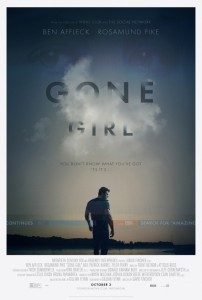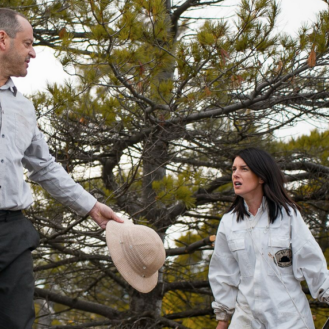David Fincher is a masterful filmmaker, but he’s even better at spinning a web of mystery and suspense. Numerous films in his catalogue deal with puzzling content, and not once have I seen him drop the ball.
He’s also a fantastic handler of, shall we say, hidden motivations. Gone Girl is an extremely difficult film to delve into without giving away too much – bear with me.
There are people in Fincher’s film that aren’t whom they say they are. They’ve been triggered by years of contempt by their significant other despite others seeing their relationship as pristine and romantic. Finally, they’ve let their pent up emotion burst with a big bang, followed by meticulous planning to cover their gutless personality.
Gone Girl executes its mission successfully and excellently. The one element that flares out as an ultimate strength, however, is how Fincher and screenwriter Gillian Flynn are able to humanly treat both the husband and wife even though one of them may be a ruthless villain. As soon as the audience figures out the answer, we can still feel a personal connection to them no matter how hard they’ve thrown us for a loop.
Flynn, who has adapted her own best seller for the big screen, quickly finds a way for her voice to work in a feature film format. The dialogue is snippy in a manner that suggests hints of Juno if the young teen was feeling lousy after morning sickness, but the all-too-sharp dialogue fits the personalities seen on screen. When paired with anxiety and deception, Flynn’s voice kicks into gear.
Ben Affleck and Rosamund Pike should be rewarded with oodles of recognition and awards for miraculously playing their roles to perfection. They sell us on their cutesy chemistry when they first meet each other, all the way through their gradual entrapment and demise with love.
Gone Girl paints a gloomy image of marital life and romantic conflicts, but the film also makes us gasp and snicker with its sense of humour. The battle of the sexes angle isn’t played up to a huge degree, which is greatly appreciated, but the manipulating the couple constantly has to sustain in order to not be left in the dust is absolutely compelling.
Relationship embroilments aside, Gone Girl makes razor-sharp stabs at how news outlets comprehend headlines, and how media manipulation towards the beguiling public is just as cutthroat as the game Affleck and Pike are tangled up in. Flynn and FIncher are also very careful about how far they push this statement. Missi Pyle plays a Nancy Grace-like host to a widely popular television show that has her viewers in a constant state of shaming rage. The duo stop at just the right point before this character becomes an outrageous parody, and Pyle does a pretty good job herself in this barely-seen role.
Like other Fincher whodunits, Gone Girl pushes a long runtime but soars by with each scene. Each moment, each silence, and every detail is important to this sly story of shrewd behaviour. I think I even caught a flash of a later-seen character in one of the film’s earlier scenes. Again, another tactic Fincher so brilliantly gets right.




Leave a comment